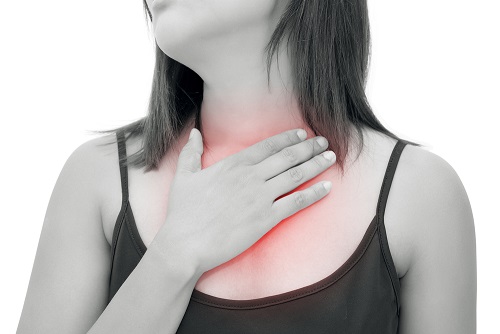
Gastroesophageal reflux is a condition of mild indigestion that affects people across the world. It is common among people of all ages. But gastroesophageal reflux disease (GERD) on the other hand is an uncommon digestive disorder. It is chronic and can affect other parts like the central nervous system, respiratory system and excretory system. This severe form of indigestion can be caused by sedentary habits and poor lifestyle.
What is GERD?
A muscular tube that connects the mouth to the stomach, the oesophagus, has an important role to play in the digestive process. The lower oesophageal sphincter (LES) is a minute bundle of muscles situated at the low end of the oesophagus, where it meets the stomach. When we eat, the LES muscles relax to allow food to travel into the stomach. And soon after, they shut off to prevent food from travelling back into the oesophagus. When the LES becomes dysfunctional, food may abruptly travel to the mouth causing GERD.
Causes
Smoking: Smoking deteriorates the digestive enzymes in the body causing food to be unsettled in the stomach for long periods. It also causes an overproduction of acid in the stomach causing a heartburn sensation
Anxiety: Anxiety causes an urgent drive to binge eat, drink and smoke to calm the mind down. These practices inevitably lead to constipation and belching
Hiatal hernia: Hiatal hernia puts undue pressure on the oesophagus leading to GERD by causing stomach acid to reflux
Connective Tissue Order- (Scleroderma): produces excessive collagen in the body which thickens the lower oesophageal sphincter and pushes bile juice back to the mouth
Caffeine: caffeine delays stomach relaxation which further hinders break down of food causing constipation and GERD
Alcohol: alcohol gastritis caused by excessive drinking decays the stomach and intestine linings causing belching and a heartburn sensation
Drug overuse: drug abuse decays bowl tissue and makes digestion harder by attacking the stomach and intestine linings
Symptoms
GERD is usually self-diagnosable. Burning pain in the chest that occurs post-eating and gets worse when lying down is an obvious symptom. Heartburn, nausea, or acid regurgitation, that is a faint taste of your food after eating, can also be symptomatic of GERD. However, some uncommon symptoms make it hard to diagnose it at times like- unusual discomfort in the upper abdomen area, dry cough, laryngitis, inflammation of gums, sudden excess of saliva, sore throat, and pain in the throat while swallowing.
These can be diagnosed with an X-Ray of the digestive system (particularly the upper stomach area), endoscopy, oesophageal impedance test which monitors the movement of elements in the oesophagus, or the ambulatory acid (pH) test which checks the quantity of acid in the oesophagus.
Self-treatment
Like diagnosing GERD, even treating it to some extent can be a self-controlled exercise by following the enlisted ways.
Saying no to: Alcohol and spicy, fatty or citric food like tomatoes, oranges, french-fries and hot sauces. These foods can trigger heartburn
Listening to the body: Keeping track of what the body hints is essential in controlling GERD. Overeating must be avoided absolutely. Eating smaller, healthier meals can ease digestion for an ailing stomach. Eating just before bed disrupts digestion as well due to a lack of physical activity and should be avoided
Losing weight: Obesity majorly contributes to a worsening case of GERD. Squeezing in an exercise in the daily routine, even if for 30 minutes can mitigate indigestion
Antacid: over-the-counter antacid tablets like Gas-O-Fast available in different flavours, attack the problem at the root, leaving a healthy digestive system!
Doctor’s appointment
At times GERD becomes untreatable with self-remedies. In such situations seeing a doctor becomes necessary. Prescription drugs like foaming agents (Gaviscon) coat the stomach to avoid reflux. H2 blockers (Pepcid, Zantac) decrease the production of acid production. Proton pump inhibitors (Aciphex, Nexium) control the quantity of acid your stomach makes.
Prokinetics (Reglan, Urecholine) strengthen the LES, empty stomach quicker, and reduce acid reflux. But one must be cautious in taking these medicines as consumption in large quantities can be very harmful. These medicines have been known to trigger indigestion when overprescribed by a doctor.
Surgery: If none of the above-mentioned treatments prove helpful, it may be time to consider surgery to strengthen the opening between the stomach and oesophagus. This becomes inevitable when the acid-reflux is caused by a physical complication such as hiatal hernia. Although in mild cases, it can be treated with watchful waiting, in severe cases, surgery is the only way.
Living with GERD
Since GERD cannot be cured, only treated, one must learn to mitigate the symptoms. Tracking what foods and habits trigger GERD in a Heartburn Log can help keep them in control naturally. Besides, reaching out to people living with similar digestive disorders on the internet can bring fresh insight and boost morale.
Disclaimer This blog solely intended for the educational/informational/awareness purposes and is not a substitute for any professional medical advice, diagnosis or treatment. Please consult your doctor/healthcare professional before acting on the information provided on the blog. Reliance on any or all information provided in the blog, is solely at your own risk and responsibility. Mankind Pharma Limited shall not be held liable, in any circumstance whatsoever.
Recent Posts
POPULAR CATEGORIES
POPULAR TAGS